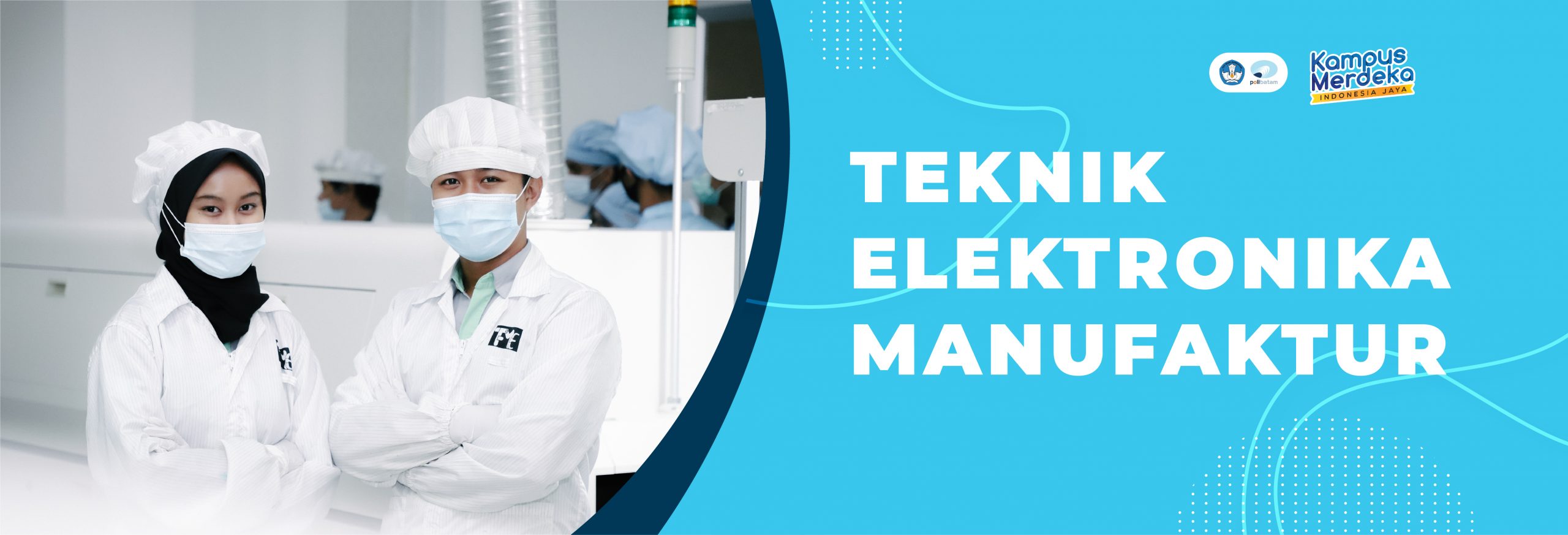Diploma 3 Manufacturing Electronics Engineering
PROFESSIONAL INDEPENDENT PROFILE
- Graduates will have a successful career in their profession in the field of electronics manufacturing or related fields.
- Graduates will apply problem-solving skills, critical thinking, communication, and management to address technical issues related to the field of electronics manufacturing.
- Graduates will demonstrate leadership and actively contribute to the improvement of their communities and the industry.
LEARNING OUTCOMES
Aspect of Attitudes
- Devout to God Almighty and capable of demonstrating religious attitudes.
- Uphold human values in carrying out duties based on religion, morality, and ethics.
- Contribute to improving the quality of life in society, the nation, the state, and civilization based on Pancasila.
- Act as citizens who are proud and love their country, possess nationalism, and a sense of responsibility toward the nation and state.
- Respect cultural diversity, viewpoints, religions and beliefs, as well as the original opinions or findings of others.
- Collaborate and exhibit social sensitivity and concern for the community and environment.
- Abide by laws and maintain discipline in social and national life.
- Internalize academic values, norms, and ethics.
- Demonstrate responsibility for work in their area of expertise independently.
- Internalize the spirit of independence, perseverance, and entrepreneurship.
Aspect of Knowledge
- Master the theoretical concepts of mathematics and applied sciences generally.
- Master theoretical concepts of semiconductor fabrication and radio-frequency microelectronics technology.
- Master general concepts of knowledge, techniques, skills, engineering, and technology in the field of electronics manufacturing, including IC Packaging, PCB Manufacturing, and Assembly.
- Master general concepts, methods, and technologies for solving problems in the field of electronics manufacturing, including IC Packaging, PCB Manufacturing, and Assembly.
- Master general concepts of engineering design for systems, components, or processes in electronics manufacturing, including IC Packaging, PCB Manufacturing, and Assembly.
- Master general concepts, principles, and techniques of written, oral, and graphical communication in technical and non-technical environments in both Indonesian and English.
- Master theoretical concepts of literacy skills, including information, digital, and media literacy, in general technical and non-technical environments.
- Master theoretical concepts of testing, measurement, and experimentation according to standards, including IPC, JEDEC, and other standards related to electronics manufacturing.
- Master general concepts of analyzing and interpreting test, measurement, and experimental results.
- Master general concepts of collaboration and teamwork.
Aspect of General Skills
- Capable of completing a wide range of tasks and analyzing data using appropriate methods, both established and non-established.
- Capable of demonstrating quality and measurable performance.
- Able to solve work-related problems in alignment with the characteristics and context of their applied expertise based on logical, innovative thinking and independently responsible for the outcomes.
- Capable of preparing accurate and valid reports on work processes and results and communicating them effectively to relevant parties.
- Able to collaborate, communicate, and innovate in their work.
- Capable of being responsible for the achievement of group work outcomes and supervising and evaluating tasks assigned to subordinates.
- Capable of self-evaluation in workgroups under their responsibility and managing professional competency development independently.
- Capable of documenting, storing, securing, and retrieving data to ensure validity and prevent plagiarism.
Aspect of Specific Skills
- Capable of applying knowledge, techniques, skills, mathematics, science, engineering, and technology to solve well-defined technical problems in electronics manufacturing.
- Capable of designing solutions for well-defined technical problems and contributing to the engineering design of systems, components, or processes in electronics manufacturing.
- Capable of written, oral, and graphical communication in well-defined technical and non-technical environments, and able to identify and use appropriate technical references.
- Capable of conducting testing, measurement, and experimentation according to standards and analyzing and interpreting the results.
- Capable of contributing effectively as a team member.
CAREER PROSPECTS
- Technician in the IC Packaging industry or semiconductor industry.
- Technician in the PCB Assembly or Surface Mount Technology (SMT) industry.
GRADUATE COMPETENCIES
The Diploma Three Program in Electronics Manufacturing Technology has two main competencies: competencies in the IC packaging industry and PCB Assembly (SMT).
Download Kurikulum Download Akreditasi


